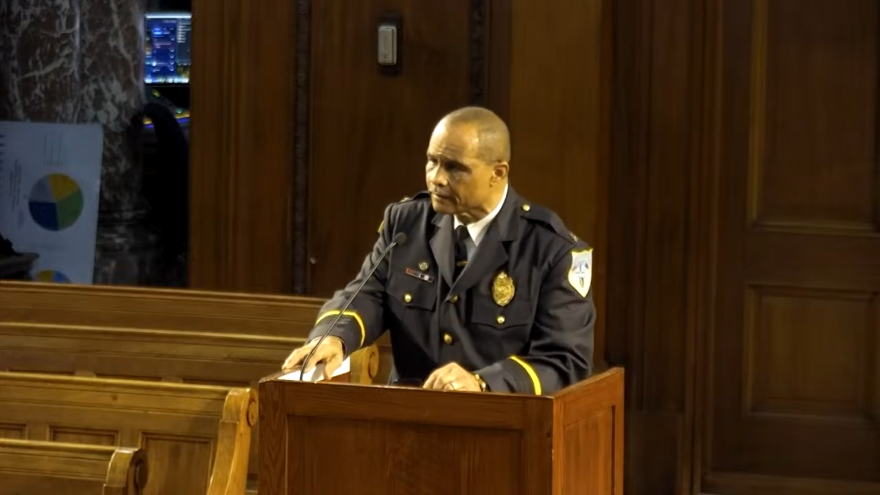Nearly a month before taking over as superintendent, Springfield Police Deputy Chief Lawrence Akers says he feels ready to become top cop.
Introduced by Springfield Mayor Domenic Sarno back in January, Akers will fill the role once superintendent Cheryl Clapprood retires in April.
A graduate of Commerce High School, Akers has called the city home for most of his life, all while serving as a second-generation Springfield officer like his father before him.
A member of the department for 38 years, Akers was promoted to provisional deputy chief last year after spending time serving throughout Springfield PD, including as a police captain and as a supervisor for the department’s special victims unit.
Speaking with WAMC, Akers emphasized one of his biggest goals for his next post: working with everyone in the city.
“If there’s people that felt that they maybe didn’t get the police representation that they’ve gotten in the past, they’re going to get that from me,” Akers said. “I’m going to be out there in every neighborhood and it doesn’t make a difference what you look like, where you live, what your social status is – I’m going to be the police superintendent for all of the people.”
Akers spoke with WAMC on Feb. 29th, shortly before taking part in a youth summit on gun violence in Springfield held at a local Boys and Girls Club.
Also speaking at the event was Bishop Talbert Swan, president of the Greater Springfield Chapter of the NAACP.
During his time at the podium, Swan touched on the 2022 federal consent decree the police department is under, which calls for changes in policies and procedures including use-of-force, officer training, and internal investigations.
The decree between the city of Springfield and United States Department of Justice was reached after a federal investigation found members of the department’s former narcotics unit routinely violated peoples’ civil rights, including cases of excessive force.
On top of that, investigators found the incidents were not properly documented. The division was ultimately disbanded by Clapprood.
Emphasizing that the victims brutalized were people of color, Bishop Swan highlighted the potential to further fix culture at the department with incoming Superintendent Akers.
“And now we have, for the first time in history, the announcement of the appointment of the first Black superintendent, Larry Akers,” Swan said. “And we’re proud of that and we’re looking forward to working with him and changing the culture in that police department.”
According to Springfield City Council President Michael Fenton, when it comes to Akers, optimism like that has been common.
“People who’ve known him personally and professionally, other cops, people who are involved in criminal justice reform advocacy, and it’s pretty rare – it takes a pretty rare and special talent to be able to develop such a consensus across the city from all of those different stakeholders because, quite frankly, they’re usually at odds over appointments like this,” Fenton told WAMC in a phone interview.
The Springfield City Council wrapped up work relating to Akers last week – including a home rule petition that, once approved by the state legislature, would also the 64-year-old to work beyond the state’s mandatory police retirement age of 65, up until 70.
Slightly more contentious, the council also agreed to re-codify the role, giving Akers the same hiring and promoting powers as his predecessors – something the Board of Police Commissioners relinquished in a memorandum of understanding with the city.
The council ultimately voted to give him the same authority, while ensuring powers are restored to the board once Akers departs.
"You know, it's the city council's right to want a Board of Police Commissioners, I mean, they spoke about it long before me - I just go with the flow, and whatever they decided, I'm going to run the police department the best I can, no matter what the decisions are that were made,” Akers said when asked about the votes taken by the city council.
For councilors like Victor Davila, the ascension of Akers is a positive one, but one that will be monitored, especially after the past few weeks’ debates and the city's attempt to re-codify the role of the board as an entity largely capable of only disciplining officers.
“This was a very contentious process and it’s a process in which I have very many objections about, and many questions – and I will continue to monitor because – we need to get this right, now,” the councilor said.
Davila added he welcomes Akers, while noting his work is cut out for him, especially given 2023’s record number of homicides, which rose above 30 last year.





